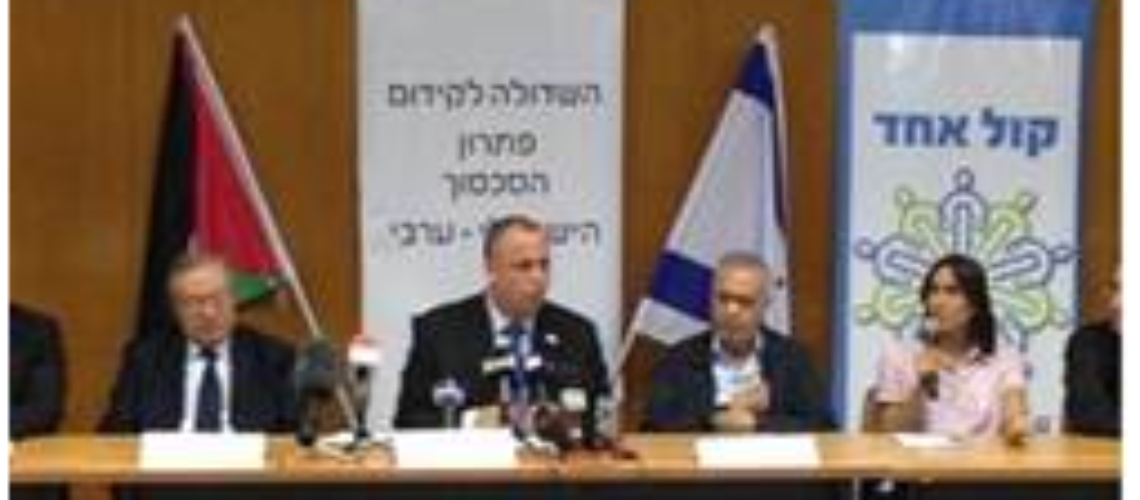Ariel Dloomy is AJEEC-NISPED Deputy Director. Ariel holds MSc. in Middle Eastern Politics from the University of London. As part of his position with AJEEC-NISPED he directs a program entitled “Civil Society for Peace.” This initiative is establishing a regional network of civil society organizations in the Middle East to promote the Arab Peace Initiative as a basis for a regional Solution. Ariel is also the director of the Israeli Society for International Development (SID Israel).
Most Ameinu members know AJEEC-NISPED from the amazing work you do in the Negev Bedouin community. Can you provide a little background on your activity regarding the Arab world and the Palestinians?
Since the organization was established we have been involved in Israeli-Palestinian projects in a variety of areas, including agricultural development, women empowerment, and development of business cooperation between Israeli and Palestinian women. These programs were reduced due to the deterioration in relations between the parties and the freeze in political negotiations. Over the last few years we have been involved with a fascinating effort to build a network of civil society activists throughout the Middle East in order to promote the principles of the Arab Peace Initiative as the basis for a regional solution. We are leading this network together with a Palestinian organization, The Center for Democracy and Community Development. The network currently includes organizations and individuals from many countries in the region, including Lebanon, Jordan, Egypt, Morocco, Saudi Arabia, Syria, Israel and Palestine.
On July 31 there was a historic meeting at the Knesset between members of Knesset and Palestinian representatives. For the first time ever, the Israeli and Palestinian flags stood side by side in the Knesset. Can you tell us about AJEEC-NISPED’s role in the event?

AJEEC-NISPED worked to set up a meeting between members of the Committee to Engage with Israeli Society established by Palestinian Authority President Mahmoud Abbas and the Knesset Caucus for a Solution to the Israeli-Arab Conflict. The caucus, with over 40 members and led by MK Hilik Bar (Labor Party) and MK Ronen Hoffman (Yesh Atid), was organized with the assistance of the One Voice organization. Based upon our contacts with the Palestinian Authority, we received a request from the Palestinians to set up a meeting and we did indeed hold a moving event in which the Israeli and Palestinian flags stood side by side. 33 MKs attended the event, including ministers Amit Peretz (Hatnua) and Yael German (Yesh Atid). The meeting took place exactly on the day that the talks opened in Washington between Tzipi Livni and Saeb Erekat, sending an important message that the negotiations have wide support in the Knesset. MKs from Yesh Atid, Labor Party, Hatnua, Shas, Meretz and Hadash participated in the event. These parties represent an absolute majority of 77 MKs who can support a future agreement with the Palestinians.
People from civil society organizations often talk about the importance of this work alongside the official political track. Can you explain this to our readers?
Over the past few year there has been a growing understanding of the need for integration of civil society into the peace process. At the end of the day, leaders sign the agreements but the people need to live in peace, so it is important that every political process be accompanied by a concentrated effort to prepare the societies to really know each other. The dramatic changes in Arab countries, as well as in Israel demonstrate that the power of the people has been strengthened and that future agreements will have to take into account the voice of the people.
With the new round of peace talks underway, we have to ask the question – are you optimistic or pessimistic about the sides reaching an agreement?
It is hard for me to give odds on the chances for the success of the current process, but one thing is certain; every day that passes distances us from a chance for a real solution of two states for two peoples. This is perhaps the last opportunity to reach such a solution due to the reality on the ground of settlement expansion, especially in Eastern Jerusalem which create a new and complicated reality.

